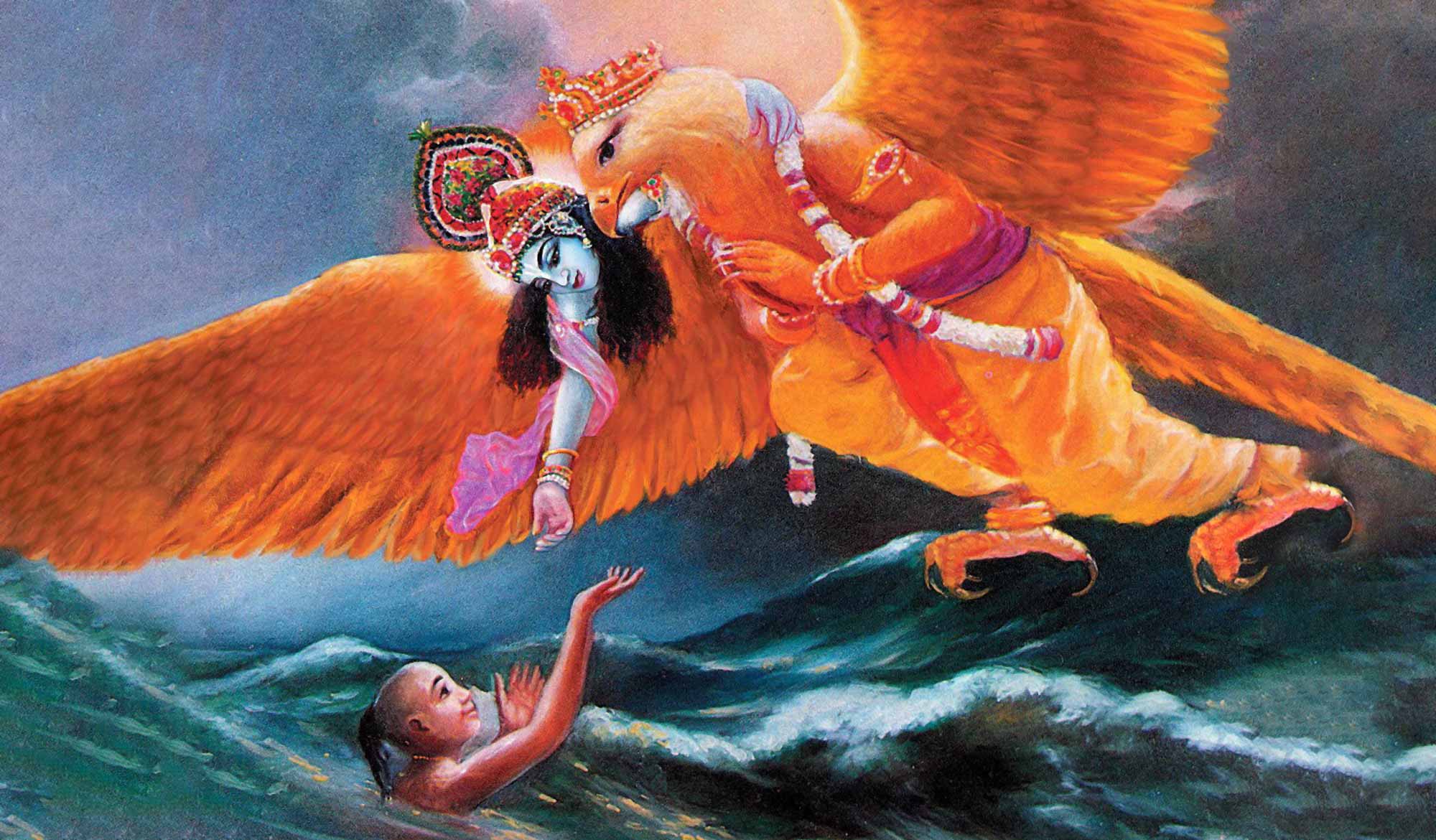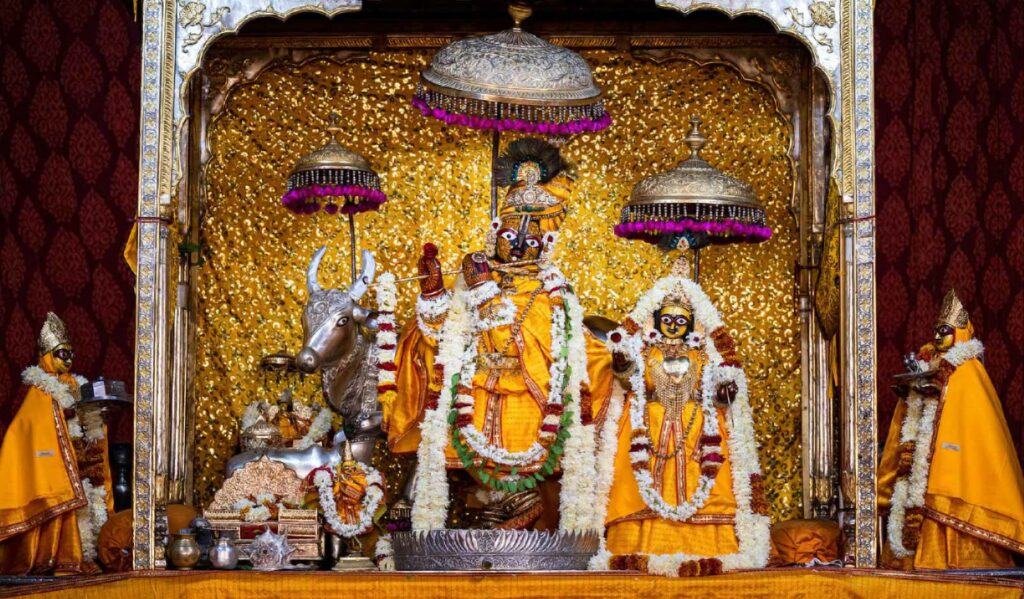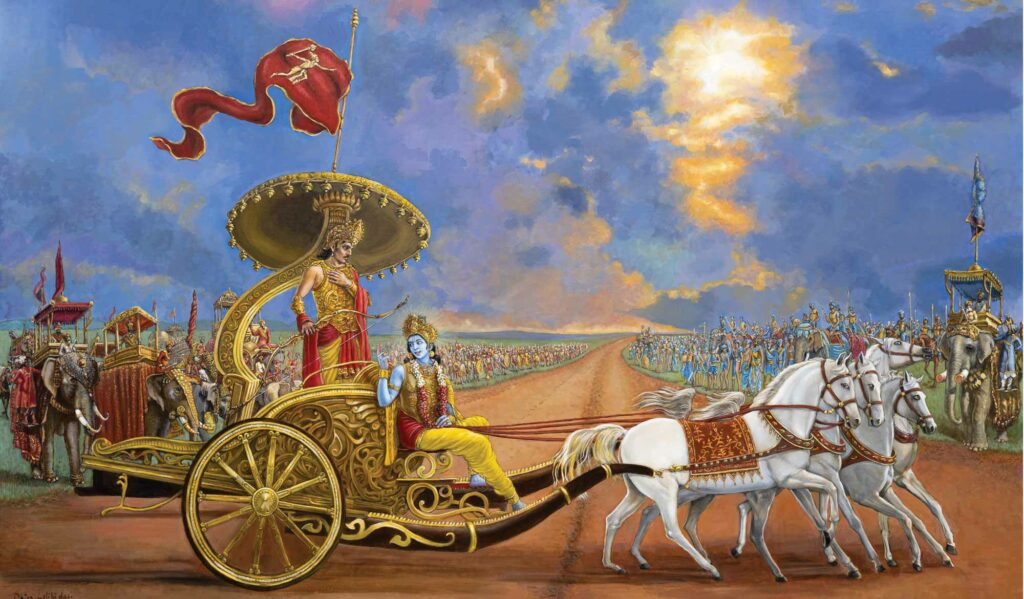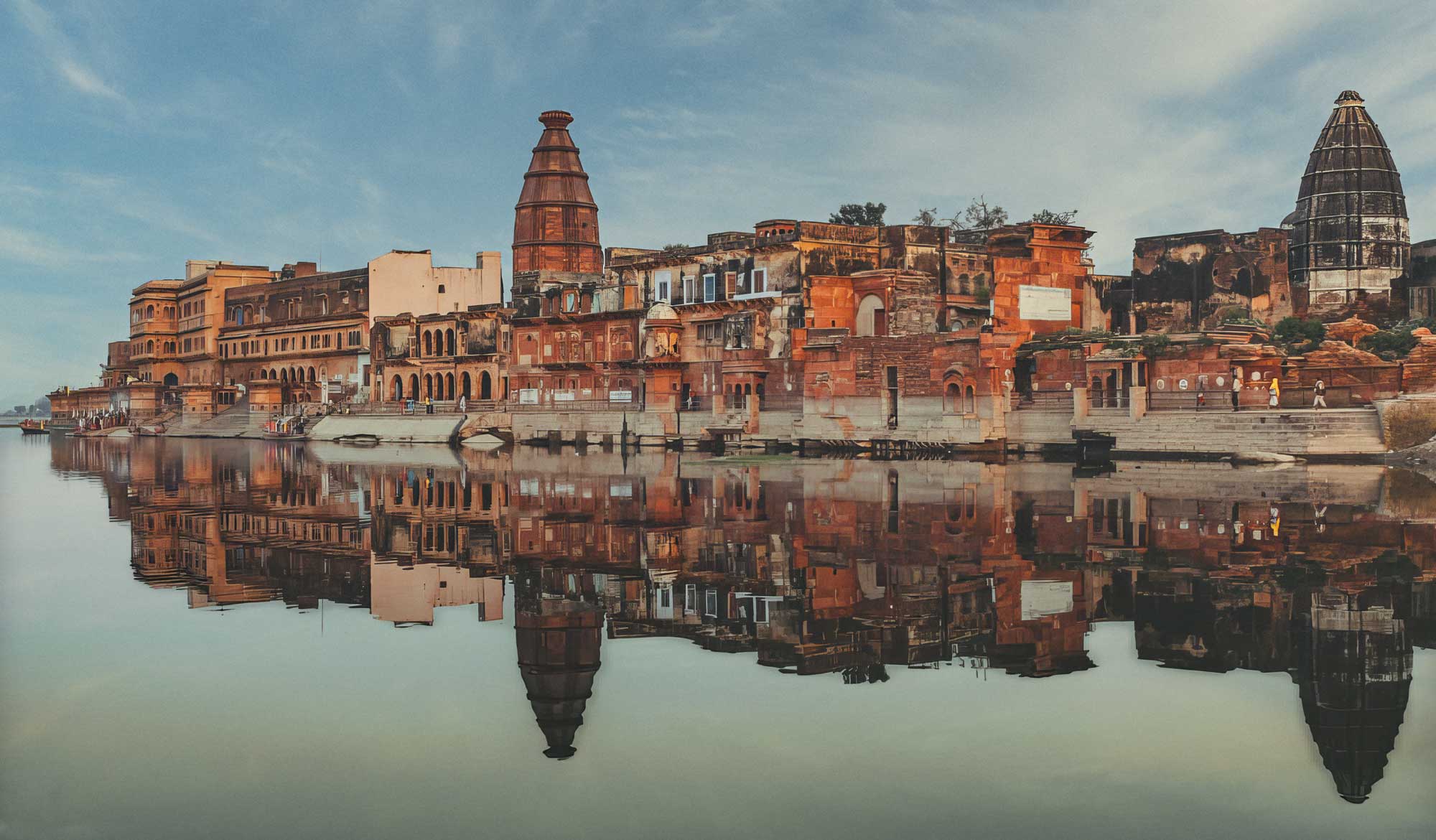Overview
The following Sanskrit prayer, Mā Muñca Pañca-daśakam, was composed by Śrīla Śrīdhara Deva Gosvāmī Mahārāja in 1967 and first published in Gauḍīya Darśana magazine, Vol. 12, Issue 6. In this touching and humble appeal, Śrīla Śrīdhara Mahārāja begs Kṛṣṇa, who is an ocean of unlimited mercy, not to abandon him.
(1)
mā muñca muñca mām kṛṣṇa! dāsaṁ dīna-dayārṇava!
patitaṁ ghora-saṁsāre hy-avaśaṁ prakṛter vaśāt
ma – do not; muñca – abandon; muñca – deliver; mam – me; kṛṣṇa – Kṛṣṇa; dāsa –servant; dīna – fallen; dayā – mercy; arṇava – ocean; patita – fallen; ghora – terrible; saṁsāre – in the cycle of birth and death; hi – completely; avaśam – helpless; prakṛteḥ – by material nature; vaśāt – enslaved.
O Kṛṣṇa! You are an ocean of mercy to the fallen. Do not abandon Your servant – do not leave me! I have fallen into this terrible cycle of birth and death. Completely enslaved by material nature, I am totally helpless.
(2)
mā muñca muñca mām kṛṣṇa! dāsaṁ dīna-dayārṇava!
anādi-bhāgya-vaiguṇyāt bhoga-mugdhaṁ durāśayam
ma – do not; muñca – abandon; muñca – deliver; mam – me; kṛṣṇa – Kṛṣṇa; dāsa –servant; dīna – fallen; dayā – mercy; arṇava – ocean; anādi – from time immemorial; bhāgya-vaiguṇyāt – by misfortune; bhoga – material enjoyment; mugdha – bewildered; durāśayam – evil desires.
O Kṛṣṇa! You are an ocean of mercy to the fallen. Do not abandon Your servant – do not leave me! Due to my misfortune from time immemorial, my heart has become bewildered with evil desires for material enjoyment.
(3)
mā muñca muñca mām kṛṣṇa! dāsaṁ dīna-dayārṇava!
māyā-krīḍanakaṁ dīnaṁ nirālambaṁ nirāśrayaṁ
ma – do not; muñca – abandon; muñca – deliver; mam – me; kṛṣṇa– Kṛṣṇa; dāsa –servant; dīna – fallen; dayā – mercy; arṇava – ocean; māyā– of māyā; krīḍanaka – plaything; dīna– pitiable; nirālambam– without support; nirāśrayam – without shelter.
O Kṛṣṇa! You are an ocean of mercy to the fallen. Do not abandon Your servant – do not leave me! I have become a plaything of Māyā. I am pitiable, with no support and no shelter.
(4)
mā muñca muñca mām kṛṣṇa! dāsaṁ dīna-dayārṇava!
janma-mṛtyu-jarā-vyādhi-bhīti-cintāti-kātaram
ma – do not; muñca – abandon; muñca – deliver; mam – me; kṛṣṇa – Kṛṣṇa; dāsa –servant; dīna – fallen; dayā – mercy; arṇava – ocean; janma – birth; mṛtyu – death; jarā – old age; vyādhi – disease; bhīti – fear; cinta – anxieties; ati – continuous; kātaram – tormented.
O Kṛṣṇa! You are an ocean of mercy to the fallen. Do not abandon Your servant – do not leave me! I am tormented by the fear of birth, death, old age, disease and other continuous anxieties.
(5)
mā muñca muñca mām kṛṣṇa! dāsaṁ dīna-dayārṇava!
jñānājñāna-kṛtānanta-pāpa-bhoga-bhayākulam
ma – do not; muñca – abandon; muñca – deliver; mam – me; kṛṣṇa– Kṛṣṇa; dāsa –servant; dīna – fallen; dayā – mercy; arṇava – ocean; jñāna– knowingly; ajñāna– unknowingly; kṛtā– done; ananta– unlimited; pāpa– vice; bhoga– experiencing; bhaya– fear; akulam– constantly.
O Kṛṣṇa! You are an ocean of mercy to the fallen. Do not abandon Your servant – do not leave me! I constantly fear paying the price of the innumerable vices that I have performed either knowingly or unknowingly.
(6)
mā muñca muñca mām kṛṣṇa! dāsaṁ dīna-dayārṇava!
kāma-krodhādi-dasyubhi nirdayaṁ pada-marditaṁ
ma – do not; muñca – abandon; muñca – deliver; mam – me; kṛṣṇa – Kṛṣṇa; dāsa –servant; dīna – fallen; dayā – mercy; arṇava – ocean; kāma – lust; krodha – anger; ādi – etc; dasyubhiḥ – by the dacoits; nirdaya – mercilessly; pada – feet; mardita – crushed.
O Kṛṣṇa! You are an ocean of mercy to the fallen. Do not abandon Your servant – do not leave me! I am mercilessly crushed under the feet of lust, anger and other dacoits.
(7)
mā muñca muñca mām kṛṣṇa! dāsaṁ dīna-dayārṇava!
antaḥ-śatru-viparyāstaṁ punaḥ punar-vilāñcitam
ma – do not; muñca – abandon; muñca – deliver; mam – me; kṛṣṇa – Kṛṣṇa; dāsa –servant; dīna – fallen; dayā – mercy; arṇava – ocean; antaḥ – internal; śatru – enemies; viparyāsta – bewildered; punaḥ – again; punaḥ – and again; vilañcita – ashamed.
O Kṛṣṇa! You are an ocean of mercy to the fallen. Do not abandon Your servant – do not leave me! Bewildered by my internal enemies, I put myself to shame again and again.
(8)
mā muñca muñca mām kṛṣṇa! dāsaṁ dīna-dayārṇava!
trāṇārthaṁ prāthyamāno’pi na māṁ pasyati kaścana
ma – do not; muñca – abandon; muñca – deliver; mam – me; kṛṣṇa – Kṛṣṇa; dāsa –servant; dīna – fallen; dayā – mercy; arṇava – ocean; trāṇa – delivered; artha – for the purpose; prārthyamāna – beg; api – although; na – not; māṁ – me; pasyati – sees; kaścana – anyone.
O Kṛṣṇa! You are an ocean of mercy to the fallen. Do not abandon Your servant – do not leave me! Although I beg to be delivered from my suffering, no one notices me.
(9)
mā muñca muñca mām kṛṣṇa! dāsaṁ dīna-dayārṇava!
pitaro bāndhavā devā asamarthā parāṅmukhā
ma – do not; muñca – abandon; muñca – deliver; mam – me; kṛṣṇa– Kṛṣṇa; dāsa –servant; dīna – fallen; dayā – mercy; arṇava – ocean; pitara– elders; bāndhava– friends; deva– demigods; asamarthā– unable; parāṅmukhā– turn away.
O Kṛṣṇa! You are an ocean of mercy to the fallen. Do not abandon Your servant – do not leave me! All my seniors, my friends and the demigods turn away from me and are unable to help me.
(10)
mā muñca muñca mām kṛṣṇa! dāsaṁ dīna-dayārṇava!
sva-para-bharasā-hīnaṁ nirupāyaṁ nirākṛtam
ma – do not; muñca – abandon; muñca – deliver; mam – me; kṛṣṇa – Kṛṣṇa; dāsa –servant; dīna – fallen; dayā – mercy; arṇava – ocean; sva – myself; para – others; bharasā – hope; hīna – lost; nirupāya – without any means; nirākṛta – dejected.
O Kṛṣṇa! You are an ocean of mercy to the fallen. Do not abandon Your servant – do not leave me! I have lost all hope in myself and in others. I have come to a dead end and feel dejected.
(11)
mā muñca muñca mām kṛṣṇa! dāsaṁ dīna-dayārṇava!
mahāparādha-rāśi-nāmālayaṁ tyakta-sādhanam
ma – do not; muñca – abandon; muñca – deliver; mam – me; kṛṣṇa – Kṛṣṇa; dāsa –servant; dīna – fallen; dayā – mercy; arṇava – ocean; mahā–aparādha – grave offences; rāśi – countless; nāma – to the Holy Name; alayam – storehouse; tyakta – rejected; sādhana – practice.
O Kṛṣṇa! You are an ocean of mercy to the fallen. Do not abandon Your servant – do not leave me! I have rejected my sādhana and have become a storehouse for countless grave offences to the Holy Name.
(12)
mā muñca muñca mām kṛṣṇa! dāsaṁ dīna-dayārṇava!
he sadasad-vicārorddha prapannārti-haro hare
ma – do not; muñca – abandon; muñca – deliver; mam – me; kṛṣṇa – Kṛṣṇa; dāsa –servant; dīna – fallen; dayā – mercy; arṇava – ocean; he – O; sat – pious; asat – impious; vicāra – judge; uddha – aloof; prapanna – those who are surrendered; arti – pain; hara – remove; hare – O Hari!
O Kṛṣṇa! You are an ocean of mercy to the fallen. Do not abandon Your servant – do not leave me! O Hari, Who is aloof from judging who is pious and impious – You relieve the pain of those who surrender unto You.
(13)
mā muñca muñca mām kṛṣṇa! dāsaṁ dīna-dayārṇava!
dāsatvaṁ dehi dāsānāṁ tava deva dayā-nidhe
ma – do not; muñca – abandon; muñca – deliver; mam – me; kṛṣṇa – Kṛṣṇa; dāsa –servant; dīna – fallen; dayā – mercy; arṇava – ocean; dāsatva – service; dehi – give; dāsānāṁ – to the servants; tava – Your; deva – O Lord; dayā – compassion; nidhe – ocean.
O Kṛṣṇa! You are an ocean of mercy to the fallen. Do not abandon Your servant – do not leave me! O Lord! O ocean of compassion! Kindly give me service unto Your servants.
(14)
mā muñca muñca mām kṛṣṇa! dāsaṁ dīna-dayārṇava!
niyuṅkṣa nitya-dāsye māṁ pradāya prema-vartanam
ma – do not; muñca – abandon; muñca – deliver; mam – me; kṛṣṇa – Kṛṣṇa; dāsa –servant; dīna – fallen; dayā – mercy; arṇava – ocean; niyuṅkṣva – engage; nitya – eternal; dāsye – in service; māṁ – me; pradāya – grant; prema – transcendental love; vartana – remuneration.
O Kṛṣṇa! You are an ocean of mercy to the fallen. Do not abandon Your servant – do not leave me! Please engage me in Your eternal service and award me with the remuneration of prema.
(15)
mā muñca muñca mām kṛṣṇa! dāsaṁ dīna-dayārṇava!
svāstaraṅga-sevāṁ dehi he gopī-jana-vallabha
ma – do not; muñca – abandon; muñca – deliver; mam – me; kṛṣṇa – Kṛṣṇa; dāsa –servant; dīna – fallen; dayā – mercy; arṇava – ocean; sva – own; antaraṅga – intimate; sevā – service; dehi – award; he – O; gopī-jana – the cowherd damsels; vallabha – beloved.
O Kṛṣṇa! You are an ocean of mercy to the fallen. Do not abandon your servant – do not leave me! O beloved of the gopīs, kindly award me Your own intimate service.
mā muñca-pañca-daśakaṁ! kṛṣṇa-dīna-dayārṇava!
tridaṇḍi-śrīdharodgītaṁ gṛhānedaṁ stavāmṛtam
ma – do not; muñca – abandon; pañca-daśaka – fifteen prayers; kṛṣṇa – Kṛṣṇa; dīna – fallen; dayā – mercy; arṇava – ocean; tridaṇḍi – tridaṇḍi-sannyāsī; śrīdhara – Śrīdhara; udgīta – loudly sings; gṛhana – accept; idaṁ – this; stave – prayer; amṛta – nectarean.
O Kṛṣṇa! O ocean of mercy to the fallen – kindly accept this nectarean prayer Mā Muñca Pañca-daśakaṁ that is loudly sung by the tridaṇḍi-sannyāsī Śrīdhara.
Related Articles, Songs and Prayers
- Śrī Gaura-hari Kusuma Stavāṣṭākam by Śrīla Bhakti Rakṣaka Śrīdhara Deva Gosvāmī
- Śrī Kusumañjalī (An Offering of Flowers) by Śrīla Bhakti Rakṣaka Śrīdhara Deva Gosvāmī
- Śrī Nāma Māhātmya (The Glories of the Holy Name) by Śrīla Bhakti Rakṣaka Śrīdhara Deva Gosvāmī
- Śrī Nityānanda Dvādaśakam by Śrīla Bhakti Rakṣaka Śrīdhara Deva Gosvāmī
- Śrīmad Bhaktivinoda Viraha Daśakam by Śrīla Bhakti Rakṣaka Śrīdhara Deva Gosvāmī
- Śrī Śrī Gaurasundara Āvirbhava Vāsare by Śrīla Bhakti Rakṣaka Śrīdhara Deva Gosvāmī
- ‘The Best of Thieves’ – An Illumination by Śrīla Bhakti Rakṣaka Śrīdhara Deva Gosvāmī
- Mā Muñca Pañca-daśakam (Fifteen Verses Praying Not to be Abandoned) by Śrīla Śrīdhara Deva Gosvāmī Mahārāja
- Śrīla Sarasvatī Gosvāmyāṣṭakam by Śrīla Śrīdhara Deva Gosvāmī Mahārāja
- Vṛndāvane Bhajana (Worship in Vṛndāvana) by Śrīla A.C. Bhaktivedānta Swami Prabhupāda
- Vaiśiṣṭyāṣṭaka (Eight Stanzas of Significance) by Śrīla A.C. Bhaktivedānta Swami Prabhupāda
- Svasti No Gaura-vidhur Dadhātu (May the Moon-like Gaura Bestow Auspiciousness) by Śrīla B.P. Purī Mahārāja
- A Prayer Composed on the Occasion of the Disappearance of Śrīla Gadādhara Paṇḍita by Śrīla Bhakti Pramoda Purī Gosvāmī
- Śrī Śrī Gaura Gopāla Praśasti (In Praise of Śrī Śrī Gaura Gopāla) by Śrīla Bhakti Pramoda Purī Gosvāmī
- Viraha-Gītikā (A Song of Separation) by Śrīla Bhakti Pramoda Purī Mahārāja
- Jaya Rādhā-Mādhava by Śrīla Bhakti Gaurava Narasiṅgha Mahārāja
- Purport to Śrīla Prabhupāda-līlā Smaraṇa-Maṅgala Stotram by Śrīla Bhakti Gaurava Narasiṅgha Mahārāja
- Purī Mahārāja’s Praṇāma Mantra by Śrīla Bhakti Gaurava Narasiṅgha Mahārāja
- Śrī Guru-viraha Ṣaṭakam – Six Verses in Separation from Śrī Guru by Swami B.V. Giri
- Śrī Guru Praṇāma Anuvākya – An Explanation of Śrīla Guru Mahārāja’s Praṇāma Mantra by Swami B.V. Giri
Further Reading from the Bhaktivinoda Institute
- Gītā-mālā (A Garland of Songs) by Śrīla Bhaktivinoda Ṭhākura (Songbook)
- Kalyāṇa Kalpataru (‘The auspicious Desire Tree’) by Śrīla Bhaktivinoda Ṭhākura (Songbook)
- Śaraṇāgati (Surrendered to the Lord’s Shelter) by Śrīla Bhaktivinoda Ṭhākura (Songbook)
- Gītāvalī (A Collection of Songs) by Śrīla Bhaktivinoda Ṭhākura (Songbook)
- Bāula Saṅgīta by Śrīla Bhaktivinoda Ṭhākura (Songbook)
- Sevā Lālasā (Hankering for Service) by Śrīla Bhaktivinoda Ṭhākura (Songbook)
- Śrī Godruma-candra Bhajanopadeśa by Śrīla Bhaktivinoda Ṭhākura
- Śrī Kṛṣṇacandra by Śrīla Bhaktivinoda Ṭhākura
- Śrī Gīta Govinda Introduction by Śrīla Bhaktivinoda Ṭhākura
- Poems by Śrīla Bhaktivinoda Ṭhākura
Pilgrimage with Swami Narasiṅgha – Part 7: Keśī Ghāṭa
Continuing with our pilgrimage series, this week Śrīla Narasiṅgha Mahārāja takes us to Keśī Ghāṭā where he tells us about Madhumaṅgala’s meeting with the Keśī demon, what Keśī represents, and how Śrīla Prabhupāda almost acquired Keśī Ghāṭa. Mahārāja also narrates his own experience. This article has been adapted from a number of talks and articles by Narasiṅgha Mahārāja.
Prema Dhāma Deva Stotram with the Narasiṅgha Sevaka Commentary – Verses 61-65
In verses 61 to 65 of 'Prema Dhāma Deva Stotram', Śrīla Śrīdhara Mahārāja narrates the pastime of Śrī Caitanya at Caṭaka Parvata In Purī and explains how the scriptures produced by Brahmā and Śiva are ultimately searching for the personality of Mahāprabhu who is merciful too all jīvas, no matter what their social position.
Prabhupāda Śrīla Sarasvatī Ṭhākura’s Visit to Ayodhyā
With the forthcoming observance of Śrī Rāma Navamī, we present 'Prabhupāda Śrīla Sarasvatī Ṭhākura’s Visit to Ayodhyā' written by Śrīla Bhaktisiddhānta Sarasvatī Ṭhākura Prabhupāda from The Gaudīyā magazine, Vol 3. Issue 21/ In December 1924, after visiting Benares and Prāyāga, Sarasvatī Ṭhākura visited the birth-site of Śrī Rāmācandra in Ayodhyā.
Śaraṇāgati – The Only Path to Auspiciousness
In this article, 'Śaraṇāgati - The Only Path to Auspiciousness', Dhīra Lalitā Dāsī analyses the process of śaraṇāgati (surrender) beginning with śraddhā (faith). She also discusses the role of śāstra and the Vaiṣṇava in connection with surrender.
Pilgrimage with Swami Narasiṅgha – Part 7: Keśī Ghāṭa
Continuing with our pilgrimage series, this week Śrīla Narasiṅgha Mahārāja takes us to Keśī Ghāṭā where he tells us about Madhumaṅgala’s meeting with the Keśī demon, what Keśī represents, and how Śrīla Prabhupāda almost acquired Keśī Ghāṭa. Mahārāja also narrates his own experience. This article has been adapted from a number of talks and articles by Narasiṅgha Mahārāja.
Prema Dhāma Deva Stotram with the Narasiṅgha Sevaka Commentary – Verses 61-65
In verses 61 to 65 of 'Prema Dhāma Deva Stotram', Śrīla Śrīdhara Mahārāja narrates the pastime of Śrī Caitanya at Caṭaka Parvata In Purī and explains how the scriptures produced by Brahmā and Śiva are ultimately searching for the personality of Mahāprabhu who is merciful too all jīvas, no matter what their social position.
Prabhupāda Śrīla Sarasvatī Ṭhākura’s Visit to Ayodhyā
With the forthcoming observance of Śrī Rāma Navamī, we present 'Prabhupāda Śrīla Sarasvatī Ṭhākura’s Visit to Ayodhyā' written by Śrīla Bhaktisiddhānta Sarasvatī Ṭhākura Prabhupāda from The Gaudīyā magazine, Vol 3. Issue 21/ In December 1924, after visiting Benares and Prāyāga, Sarasvatī Ṭhākura visited the birth-site of Śrī Rāmācandra in Ayodhyā.
Śaraṇāgati – The Only Path to Auspiciousness
In this article, 'Śaraṇāgati - The Only Path to Auspiciousness', Dhīra Lalitā Dāsī analyses the process of śaraṇāgati (surrender) beginning with śraddhā (faith). She also discusses the role of śāstra and the Vaiṣṇava in connection with surrender.








